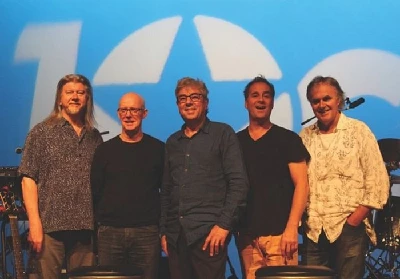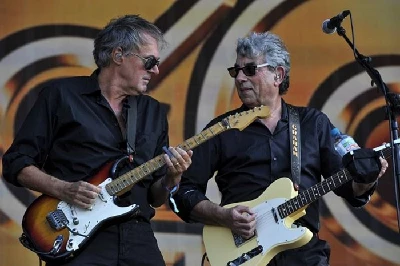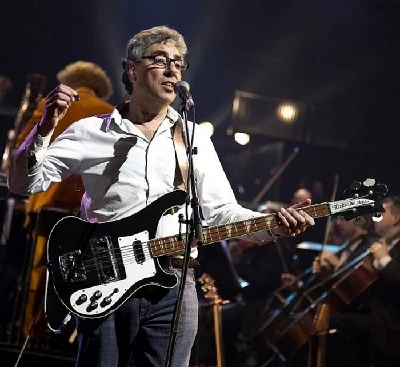10cc
-
Interview
published: 19 /
4 /
2017

In his second Pennyblackmusic interview, award-winning British songwriter Graham Gouldman discusses with Lisa Torem 10cc’s upcoming UK tour and songs that fired up his youthful imagination
Article
Graham Gould simply has that magical touch. Early in his career, he wrote ‘Bus Stop’ for Tthe Hollies, ‘No Milk Today’ for Herman’s Hermits and ‘For Your Love’ for the Yardbirds; breathtaking songs packed with emotion, which helped propel these British bands into major stardom.
With 10cc, Gould and his colleagues continued the craft. There was ‘Donna’ in 1973, followed by ‘Rubber Bullets’ and ‘The Dean and I’ in 1973; ‘Wall Street Shuffle’, which came to fruition the following year, combined sly political overtones with a contagious backbeat. 10cc could not be categorized; the band’s discography illustrated that point again and again.
To that end, 10cc's career boasts eleven Top 10 UK singles, including: ‘I’m Not in Love’ and ‘Art for Art’s Sake’ in 1975 and ‘The Things We Do For Love’ and ‘I’m Mandy Fly Me’ in 1976.
Their inclusive messages carry such universal appeal that their catchy, reggae-inspired 1978 single ‘Dreadlock Holiday’ was even used in ‘The Social Network’.
Although the original line-up broke up to seek out contrasting opportunities, the current line-up continues to tour internationally. Last Autumn, they completed tours in Australia and New Zealand.
In the spring, they concluded a tour of Belgium and the Netherlands, whilst the summer found the group performing in Denmark, Norway and Germany.
On their upcoming UK tour, they’ll keep their promises to please the veteran fans, and probably sneak in some new material. In his second Pennyblackmusic interview, Graham Gouldman gets us up to speed.
Graham Gouldman has a warm, sonorant speaking voice. He takes his time responding; treating each question as a welcome guest in his living room. When he talks about how much performing and writing matter to him, his sincerity shines through. On the one hand, you really can’t imagine him doing anything else; loving anything else that much, yet he’s the guy who would probably do any number of things just as wel. He inspires that confidence in people and his chestnuts as well as his more recent work, such as the reflective ballads of ‘Love and Work’, mirror his naturally creative spirit.
PB: We spoke a while back before you went to the Songwriter’s Hall of Fame Awards. I understood there was a video there commemorating your career. What are your memories of that night?
GG: When you see your life (Laughs) condensed into a few minutes, it’s quite something, actually. I knew that they had put something together, but to actually see it was quite amazing and I enjoyed it (Laughs).
The whole event was fantastic. I got to see some old friends and make new friends, particularly some that I had admired and some that I had worked with previously, as well.
I saw Gary Burr, who was Country Songwriter of the Year and had been for quite a few years and Jimmy Webb, who is the chairman of the Songwriter’s Hall of Fame. I’ve never worked with him, but I had met him previously and he’s in one of my top five of great songwriters, so just to see him was enough.
PB: You originally wanted to become a drummer?
GG: Yes, when I started playing, yeah.
PB: So how important is rhythm to you when conceptualising a song?
GG: Vital. You can hear a rhythm, even when a drum machine is playing something, and you can almost hear a melody in it, sometimes. So, yeah, incredibly important.
PB: You wrote ‘Bus Stop,’ which is very melodic, but extremely rhythmic. Did you come up with those two elements at the same time?
GG: Yeah. The rhythm of that was sort of the de jour rhythm (Laughs), because a lot of the Beatles’ songs were that rhythm, and we were all, everybody, and I obviously still am, as many people are, in love with the Beatles. They were my main inspiration. So a lot of the time I was just trying to copy them, but when you try to copy something it actually never works. Something else can come out that’s probably still very good.
PB: How old were you when you wrote your first song?
GG: Probably eighteen, when I started writing seriously and nineteen, when I started having some success.
PB: You recently supported 10cc’s second album, ‘Sheet Music’ on tour. You co-wrote about one third of that album and not just with one band member, but with various members. That was fairly unusual for the time. It was more common to hear about consistent pairings like Lennon/McCartney.
GG: Yeah, it was quite unusual in that we all really mixed it up; we had different songwriting partnerships. There never was a band like 10cc and there never will be. Not only did we write in different combinations, we had three number one records with three different singers.
PB: Of course ‘I’m Not in Love’ is still considered one of the band’s greatest hits. A few weeks ago, I was on an airplane and heard the song not only on the most recent Bridget Jones’s movie, ‘The Edge of Reason', but also on ‘Guardians of the Galaxy.’
GG: They keep using it and long may they do so.
PB: How do you account for that? Is it the irony of the lyrics? Or that it was such a one-off production? For example, those sophisticated vocal loops…
GG: It’s a combination of so many things. It was right for the time. There’s something about the melody of the song. Originally when we wrote it, it was almost like a bossa nova. We all wanted it to be like a Burt Bacharach song, but that didn’t work. We sort of put it away and then we came up with a different rhythm that absolutely suited it perfectly. It’s hard to explain why it’s like it is because when you’re writing you’re not really conscious of what you’re doing. You’re just doing it, but the combination of the mood, of the track and the use of the voices created a very original sound and the words and the melody; the way it’s sung, the whole production thing is part of this, as well. There’s a combination of so many different elements that goes towards making it what it is.
PB: I just heard Chrissie Hynde’s version, which is exquisite. What are your favourite versions?
GG: Yeah, the Pretenders. Peggy Lee did a nice one and there’s been some unusual ones such as the Fun Lovin' Criminals.
Petula Clark did a terrible version; a disco version. Richie Havens did the most original one, I thought. You should check that out.
PB: I will check that out.
GG: They’re very, very different.
PB: So let’s get back for a minute to ‘Sheet Music’.
GG: We toured the album for the last couple of years. We’ve finished doing that now, but it was great to do something in its entirety.
PB: Lots of young people don’t get a chance to hear an entire album in a concert setting.
GG: Yeah, the album thing’s gone.
PB: So do you think your audience appreciated making that connection?
GG: Yeah, you put on an album and you’ve got some company for the evening. It’s like reading a book or watching a whole movie, not just a quick snap shot of different people’s songs. There are so many reasons for that now, but kids today are missing out on something that we had by sitting down with an album that had, also, art work, as well as anything else. All the musicians that were in the studio and the engineers were credited. It was a rich package that you got if you found an album that you loved. It’s a wonderful thing.
PB: 10cc is about to embark on a a thirteen day 'Greatest Hits and More' UK tour. What are you most excited about?
GG: Just playing again. I love playing. I don’t care where. (Laughs). I just love playing.
PB: So it doesn’t matter whether you’re performing at an old tavern or a historical place like the London Palladium?
GG: That’s correct. As long as there are people in the old tavern. As long as there is an audience. That’s quite an important element. (Laughs). I really don’t mind. We play at all different venues all the time. We’ve been playing massive festivals with 10,000 people and then you might be playing in a small place, you know, just a thousand seats and it’s fine.
PB: Regarding the line-up, lead guitarist/singer Rick Fenn and drummer Paul Burgess have been around for the longest amount of time. How did the other players get involved?
GG: Just through recommendations from other musicians. Mick Wilson, who does a lot of our vocals, we met through a friend of Rick’s. Our keyboard player Keith Hayman came through our previous keyboard player, so they’re all on recommendations from other musician friends, really, or co-workers.
PB: What music will you be focusing on for the upcoming UK tour?
GG: We’re going to do all the songs that you would expect to hear. We do quite a lot of album tracks. We’re going to do some of the songs from the ‘Sheet Music’ album. It went down really well and I’m going to cherry pick a few of those. I’m going to bring back, possibly, a song that we used to do that we haven’t done for a long time. It feels like it might be the right time to bring it back.
I’ll plan as much as I can ahead, but there’s only one way of finding out whether a set list works or how anything works. You have to do it in front of an audience and then you find out and then we’ll just change it if it doesn’t feel right.
PB: Your father played a big role in your career. He came up with the title, ‘No Milk Today.’
GG: And some of the words, as well.
PB: That song reminds me of an American classic, ‘A Cottage for Sale,’ in which the title serves as a metaphor and evokes something quite universal and deep. How did your father encourage you to create emotional depth through the lyrics?
GG: It wasn’t that sort of deep, really. When he told me the idea, I thought it was a terrible idea. Who is going to be interested in that? But when he explained the idea of the thought behind it, and he had this line, “The bottle stands forlorn, a symbol of the dawn,” I thought, poetic (Laughs) and it was easy to write it from there.
PB: Are there any particular poems or books from which you have drawn inspiration?
GG: Not really, no. It’s really music that keeps me motivated.
PB: You spent some time working for a publishing house, where there was a lot of pressure to write. Have you ever had a dry spell? And, if so, how did you reactivate your synapses?
GG: I’ve not really had a dry spell. It’s not a dry spell, I just don’t feel inspired to write. If I don’t have to, then I won’t do it. And that’s fine. But I find when I come back to writing after a long period of having time off, it’s like all of the ideas have subconsciously been stored up in my mind and then they come out. But I find the best thing that inspires me -I don’t wait for inspiration from myself, which comes very rarely, but if I’m writing with somebody else, then that kind of pushes me more to come up with something.
PB: Are there people out there with whom you would still like to co-write?
GG: I don’t know what to say about that. I guess there are people I would like to work with if I were asked, but I can’t tell you who, specifically, to tell you the truth (Laughs).
PB: Is there a type of individual, then, that you would like to write with?
GG: It would be nice to write with someone from a completely different area of music, because I’m a white, Jewish, British songwriter; someone Cuban or Latin American, something like that; that would be interesting.
PB: You mentioned the bossa nova, earlier…
GG: All musicians listen to everything and absorb everything, but lots of American music - we might aspire to try and play it properly - that’s one area of music; but I love Indian music, as well, and that takes a lifetime of understanding.
PB: The raga form, for example.
GG: It’s incredible. I love it.
PB: I just finished Brian Wilson’s biography. He references Rosemary Clooney’s version of the American song, ‘Tenderly’ as a prototype for evocative phrasing. Were there songs from your youth that kept hounding you, that inspired your writing or phrasing?
GG: Probably everything the Beatles wrote. But now there are songs that I wish I had written, like anything from ‘West Side Story’; ‘Somewhere’, in particular, for its ultimate beauty and simplicity. I love songs like ‘The Folks That Live on the Hill’ by Peggy Lee. I love that song. Gorgeous. So I’d love to write something like that. It’s not in my DNA somehow, but it’s in my mind, so maybe it’s influencing me.
PB: When we look at your discography, it’s clear that you have stretched yourself so much already, but still, we don’t know what direction Graham Gouldman is going to take.
GG: No, we don’t. That’s the beauty of it. Anything can happen.
PB: And what are you looking forward to this year?
GG: Getting back on the road again. We’ve been off for about three months - I’ve really missed that, and getting back in the studio. I’ve written some new songs and I’m going to put an EP out; so just the general writing, recording and playing live.
PB: Is it too early to ask about the contents of your upcoming EP?
GG: Yes. (Laughs). I’m going to do it online. The last album I put out, my solo album, was a CD, ‘Love and Work,’ but I’m taking the easy route this time.
PB: Thank you.
Band Links:-
http://www.10ccworld.com
https://en-gb.facebook.com/10ccBand/
https://twitter.com/10ccWorld
https://en.wikipedia.org/wiki/10cc
Picture Gallery:-

